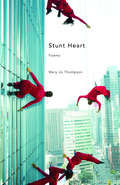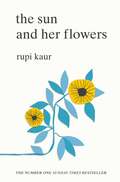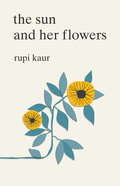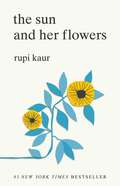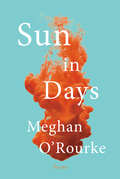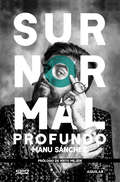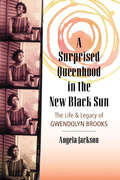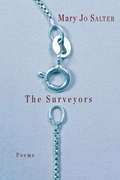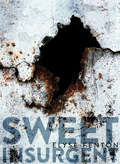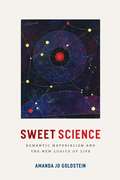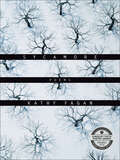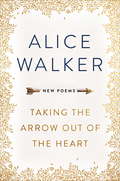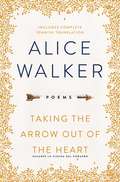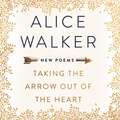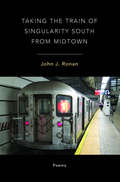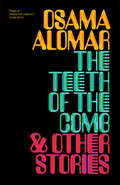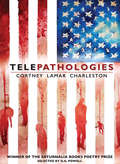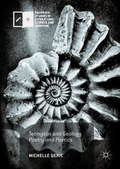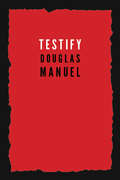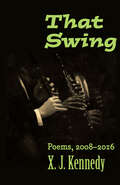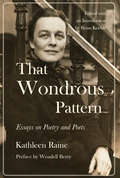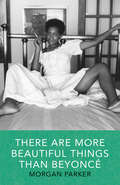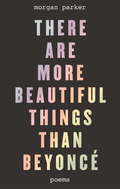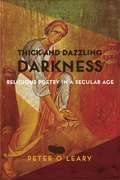- Table View
- List View
Stunt Heart (The Backwaters Prize in Poetry)
by Mary Jo ThompsonIn Stunt Heart, Mary Jo Thompson’s debut collection,a female gaze locates the ironies inside the subjects of marriage and death, loneliness and love, speaking and silence. The title plays on both sick hearts and circus tricks, and appropriately, these poems are direct, personal, and disarmingly emotive. Look at the end of the first poem, “Says Penelope,” where the speaker suddenly veers to “Newsflash: I sleep- / walk.” These stark moments of admission are used to perfection in the centerpiece sonnet series, “Thirteen Months,” the collection’s highlight. Distilled emotion over the illness and death of an estranged husband ranges in tone from the dark humor that compares the marriage to a used car to the elegiac imagery of protecting the family garden from frost. The shock of seeing the deceased in his casket looking like a cross between Clark Gable and Dracula seasons the collection, recurring in ruminations on the various ways a body is prepared at death and the story of a mother who dies while sneezing. Although no one brings back the dead by writing poetry, in Stunt Heart,Thompson revisits them with credible humor and tough dispatches from bedrooms, graveyards, and hospital hallways. Thompson’s Stunt Heart jukes, dodges, and prays while muscling through all manners of demise and in the process reveals how one can turn grief into speech, art into grieving.
The Sun and Her Flowers
by Rupi Kaur<P>From Rupi Kaur, the #1 New York Times bestselling author of milk and honey, comes her long-awaited second collection of poetry. A vibrant and transcendent journey about growth and healing. Ancestry and honoring one’s roots. Expatriation and rising up to find a home within yourself. <P>Divided into five chapters and illustrated by Kaur, the sun and her flowers is a journey of wilting, falling, rooting, rising, and blooming. A celebration of love in all its forms. <P> this is the recipe of life said my mother as she held me in her arms as i wept think of those flowers you plant in the garden each year they will teach you that people too must wilt fall root rise in order to bloom <P><b>A New York Times Bestseller</b>
The Sun and Her Flowers
by Rupi Kaur<P>From Rupi Kaur, the #1 New York Times bestselling author of milk and honey, comes her long-awaited second collection of poetry. A vibrant and transcendent journey about growth and healing. Ancestry and honoring one’s roots. Expatriation and rising up to find a home within yourself. <P>Divided into five chapters and illustrated by Kaur, the sun and her flowers is a journey of wilting, falling, rooting, rising, and blooming. A celebration of love in all its forms. <P> this is the recipe of life said my mother as she held me in her arms as i wept think of those flowers you plant in the garden each year they will teach you that people too must wilt fall root rise in order to bloom <P><b>A New York Times Bestseller</b>
The Sun and Her Flowers
by Rupi Kaur<p>From Rupi Kaur, the #1 New York Times bestselling author of milk and honey, comes her long-awaited second collection of poetry. A vibrant and transcendent journey about growth and healing. Ancestry and honoring one’s roots. Expatriation and rising up to find a home within yourself. <p>Divided into five chapters and illustrated by Kaur, the sun and her flowers is a journey of wilting, falling, rooting, rising, and blooming. A celebration of love in all its forms.</p>
Sun in Days: Poems
by Meghan O'RourkeA groundbreaking new collection by a celebrated writer of “ambitious and dynamic poems” (New York Times). From the acclaimed poet and critic Meghan O’Rourke comes a powerful collection about the frailty of the body, the longing for a child, and the philosophical questions raised when the body goes dramatically awry. In formally ambitious poems and lyric essays, Sun in Days gives voice to the experience of illness, the permanence of loss, and invigorating moments of grace. Wresting a recuperative beauty from one’s days, O’Rourke traces an arc from loss and illness to the life force of pregnancy and motherhood. Along the way, she investigates a newfound existential awareness of all that vanishes. This is O’Rourke’s most ambitious book to date: unsentimental yet deeply felt, and characterized by the lyric precision and force of observation for which her work is known. From “Idiopathic Illness” What can be said? I came w/o a warranty, Stripped of me—or me-ish-ness— I was a will in a subpar body. I waxed toward all that waned inside.
Surnormal profundo
by Manu Sánchez<br>como yo te hablo, <br> como yo te hablo, <br> convéncete, escolta nen, <br>nadie te hablará, <br> ningú et parlarà, <br> nadie porque yo... <br> Te hablo en un idioma sobrehumano, <br>yo, te cambio «to» las eses por las zetas, <br> yo, me como los finales y las letras, <br> yo, no cambio un «qué teh’quiero» por «t’estimo molt», <br> no pruebo el espetec habiendo salchichón, <br>te digo «quillo», «pisha», «polla», «miarma », <br> yo, te hablo pero tú no entiendes nada, <br> yo, que llevo ya 3.000 años hablando, <br> yo, lo mío es como lo tuyo sin malaje, <br>yo, me quedo sin frenillo por hablarte, <br> yo, te hablo a puro grito y en silencio, <br> yo, si no me entiendes el problema no soy yo.
A Surprised Queenhood in the New Black Sun: The Life & Legacy of Gwendolyn Brooks
by Angela JacksonA look back at the cultural and political force of Pulitzer Prize–winning poet Gwendolyn Brooks, in celebration of her hundredth birthdayArtist–Rebel–PioneerPulitzer-Prize winning poet Gwendolyn Brooks is one of the great American literary icons of the twentieth century, a protégé of Langston Hughes and mentor to a generation of poets, including Sonia Sanchez, Nikki Giovanni, and Elizabeth Alexander.Her poetry took inspiration from the complex portraits of black American life she observed growing up on Chicago’s Southside—a world of kitchenette apartments and vibrant streets. From the desk in her bedroom, as a child she filled countless notebooks with poetry, encouraged by the likes of Hughes and affirmed by Richard Wright, who called her work “raw and real.”Over the next sixty years, Brooks’s poetry served as witness to the stark realities of urban life: the evils of lynching, the murders of Emmett Till and Malcolm X, the revolutionary effects of the civil rights movement, and the burgeoning power of the Black Arts Movement. Critical acclaim and the distinction in 1950 as the first black person ever awarded a Pulitzer Prize helped solidify Brooks as a unique and powerful voice.Now, in A Surprised Queenhood in the New Black Sun, fellow Chicagoan and award-winning writer Angela Jackson delves deep into the rich fabric of Brooks’s work and world. Granted unprecedented access to Brooks’s family, personal papers, and writing community, Jackson traces the literary arc of this artist’s long career and gives context for the world in which Brooks wrote and published her work. It is a powerfully intimate look at a once-in-a-lifetime talent up close, using forty-three of Brooks’s most soul-stirring poems as a guide.From trying to fit in at school (“Forgive and Forget”), to loving her physical self (“To Those of My Sisters Who Kept Their Naturals”), to marriage and motherhood (“Maud Martha”), to young men on her block (“We Real Cool”), to breaking history (“Medgar Evers”), to newfound acceptance from her community and her elevation to a “surprising queenhood” (“The Wall”), Brooks lived life through her work.Jackson deftly unpacks it all for both longtime admirers of Brooks and newcomers curious about her interior life. A Surprised Queenhood in the New Black Sun is a commemoration of a writer who negotiated black womanhood and incomparable brilliance with a changing, restless world—an artistic maverick way ahead of her time.
The Surveyors: Poems
by Mary Jo SalterA beautiful new collection from Mary Jo Salter brings us poems of puzzlement and acceptance in the face of life's surprises. "I'm still alive and now I'm in Bratislava," says the speaker of one of Salter's poems, as she travels with her unlikely late-in-life love, a military man. She never expected to be here, to know someone like him, to be parted from her previous life; how did it happen? Time is hurtling, but these poems try to slow it down to examine its curious by-products--the prints of Dürer, an Afghan carpet, photographs of people we've lost. The title poem, a crown of sonnets, takes up key moments in the poet's past, the quirky advent of poetic inspiration, and the seemingly sci-fi future of the universe. Throughout, in a tone of ironic wonderment, placing rich new love poems alongside some inevitable poems of leavetaking, Salter invites the reader to weigh and ponder the way things have turned out--for herself, for all of us--in this new century, and perhaps to conclude, as she does, "That's funny . . . "From the Hardcover edition.
Sweet Insurgent
by Elyse FentonElyse Fenton’s follow-up to her critically acclaimed first book furthers the great themes of women in wartime. From intimate meditations on birthing, motherhood, and parenting in a time of war, to its explorations of the frank and grave matters surrounding a life lived while a lover is off fighting a war, these lush poems of the human interior always put themselves in harm’s way, for there the poet finds the truest meanings. Sweet Insurgent, winner of the Alice Fay di Castagnola Prize, is a book of vivid and crushing lyric poems, each one landing like a mortar to the earth.
Sweet Science: Romantic Materialism and the New Logics of Life
by Amanda Jo GoldsteinToday we do not expect poems to carry scientifically valid information. But it was not always so. In Sweet Science, Amanda Jo Goldstein returns to the beginnings of the division of labor between literature and science to recover a tradition of Romantic life writing for which poetry was a privileged technique of empirical inquiry. Goldstein puts apparently literary projects, such as William Blake’s poetry of embryogenesis, Goethe’s journals On Morphology, and Percy Shelley’s “poetry of life,” back into conversation with the openly poetic life sciences of Erasmus Darwin, J. G. Herder, Jean-Baptiste Lamarck, and Étienne Geoffroy Saint-Hilaire. Such poetic sciences, Goldstein argues, share in reviving Lucretius’s De rerum natura to advance a view of biological life as neither self-organized nor autonomous, but rather dependent on the collaborative and symbolic processes that give it viable and recognizable form. They summon De rerum natura for a logic of life resistant to the vitalist stress on self-authorizing power and to make a monumental case for poetry’s role in the perception and communication of empirical realities. The first dedicated study of this mortal and materialist dimension of Romantic biopoetics, Sweet Science opens a through-line between Enlightenment materialisms of nature and Marx’s coming historical materialism.
Sycamore: Poems
by Kathy FaganThese “flinty, well-crafted poems abound with texture and verve” as the author explores nature, love, and mourning in a landscape all her own (Publishers Weekly).This collection of meditative poems by Kathy Fagan takes the sycamore as its inspiration—and delivers precise, luminous insights on lost love, nature, and the process of recovery. “It is the season of separation & falling / Away,” Fagan writes. And so—like the abundance of summer diminishing to winter, and like the bark of the sycamore, which sheds to allow the tree’s expansion—the speaker of these poems documents a painful loss and tenuous rebirth, which take shape against a forested landscape.Black walnuts fall where no one can eat or smell them. Cottonwood sends out feverish signals of pollen. And everywhere are sycamores, informed by Fagan’s scientific and mythological research. Spellbinding and ambitious, Sycamore is an important new work from a writer whose poems “gleam like pearls or slowly burning stones” (Philip Levine).A 2018 Kingsley Tufts Poetry Award Finalist
Taking the Arrow out of the Heart
by Alice WalkerAlice Walker, author of the Pulitzer Prize-winning modern classic, The Color Purple, returns with a poetry collection that is both playfully imaginative and intensely moving. In Taking the Arrow Out of the Heart, Alice Walker examines our troubled times, while also chronicling a life well-lived. From poems of painful self-inquiry, to celebrating the simple beauty of everyday life, Walker offers us a window into her magical, at times difficult, and liberating world of activism, love, hope and, above all, gratitude. Whether she's urging us to preserve an urban paradise or behold exploring the necessity of beauty to the spirit, Walker demonstrates that she remains a revolutionary poet and an inspiration to generations of fans.
Taking the Arrow Out of the Heart
by Alice WalkerAlice Walker, author of the National Book Award and Pulitzer Prize-winning The Color Purple—“an American novel of permanent importance” (San Francisco Chronicle)—crafts a bilingual collection that is both playfully imaginative and intensely moving.Presented in both English and Spanish, Alice Walker shares a timely collection of nearly seventy works of passionate and powerful poetry that bears witness to our troubled times, while also chronicling a life well-lived. From poems of painful self-inquiry, to celebrating the simple beauty of baking frittatas, Walker offers us a window into her magical, at times difficult, and liberating world of activism, love, hope and, above all, gratitude. Whether she’s urging us to preserve an urban paradise or behold the delicate necessity of beauty to the spirit, Walker encourages us to honor the divine that lives inside all of us and brings her legendary free verse to the page once again, demonstrating that she remains a revolutionary poet and an inspiration to generations of fans.
Taking the Arrow out of the Heart
by Alice WalkerAlice Walker, author of the Pulitzer Prize-winning modern classic, The Color Purple, returns with a poetry collection that is both playfully imaginative and intensely moving. In Taking the Arrow Out of the Heart, Alice Walker examines our troubled times, while also chronicling a life well-lived. From poems of painful self-inquiry, to celebrating the simple beauty of everyday life, Walker offers us a window into her magical, at times difficult, and liberating world of activism, love, hope and, above all, gratitude. Whether she's urging us to preserve an urban paradise or behold exploring the necessity of beauty to the spirit, Walker demonstrates that she remains a revolutionary poet and an inspiration to generations of fans.
Taking the Arrow out of the Heart
by Alice WalkerAlice Walker, author of the Pulitzer Prize-winning modern classic, The Color Purple, returns with a poetry collection that is both playfully imaginative and intensely moving. In Taking the Arrow Out of the Heart, Alice Walker examines our troubled times, while also chronicling a life well-lived. From poems of painful self-inquiry, to celebrating the simple beauty of everyday life, Walker offers us a window into her magical, at times difficult, and liberating world of activism, love, hope and, above all, gratitude. Whether she's urging us to preserve an urban paradise or behold exploring the necessity of beauty to the spirit, Walker demonstrates that she remains a revolutionary poet and an inspiration to generations of fans.(p) Simon & Schusters US 2018
Taking the Train of Singularity South from Midtown
by John J. RonanThe general theme of this book, and a number of its individual poems, is that love and language create community. There is little self- reference and confession. Set in Gloucester, New York, or Paris, in Panama or Newtown, the poems come from a commitment to civic poetry, a poetry of social place and witness. Civic poetry is poems written for the public on community topics; poetry accessible to an attentive, general audience. And since it is often meant to be read in public, civic poetry relies on sound and familiar forms: rhyming tricks, assonance, consonance, regular rhythms, refrain and stanza, couplets, etc. And of course, civic poetry, like all poetry, is insightful, well-crafted and fresh, never talks down, and is never watered down.Besides accessibility, sound, rhythm, and freshness, there is another necessary ingredient in civic poetry: hope. Not innocent or immature hope, nothing naive. It may be a battered hope, even diminished, but is not cowed or faint, remains brassy, unabashed. Civic poetry makes no apologies for believing in our stressed and distorted, but wonderful national experiment.
The Teeth of the Comb & Other Stories
by Osama Alomar C. J. CollinsWonderful short stories that sharpen awareness, from a brilliantly gifted Syrian refugee Personified animals (snakes, wolves, sheep), natural things (a swamp, a lake, a rainbow, trees), mankind’s creations (trucks, swords, zeroes) are all characters in The Teeth of the Comb. They aspire, they plot, they hope, they destroy, they fail, they love. These wonderful small stories animate new realities and make us see our reality anew. Reading Alomar’s sly moral fables and sharp political allegories, the reader always sits up a little straighter, and a little wiser. Here is the title story: Some of the teeth of the comb were envious of the class differences that exist between humans. They strived desperately to increase their height, and, when they succeeded, began to look with disdain on their colleagues below. After a little while the comb’s owner felt a desire to comb his hair. But when he found the comb in this state he threw it in the garbage.
Telepathologies
by Cortney Lamar CharlestonCortney Lamar Charleston’s debut collection looks unflinchingly at the state of race in 21st Century America. Today, as much as ever before, the black body is the battleground on which war is being waged in our inner cities, and Charleston bares witness with fear, anger, and glimpses of hope. He watches the injustice on T.V., experiences it firsthand at simple traffic stops, and even gives voice to those like Eric Garner and Sandra Bland who no longer can. Telepathologies is a shout in the darkness, a plea for sanity in an age of insantiy, and an urgent call to action.
Tennyson and Geology: Poetry and Poetics (Palgrave Studies in Literature, Science and Medicine)
by Michelle GericThis book offers new interpretations of Tennyson's major poems along-side contemporary geology, and specifically Charles Lyell's Principles of Geology (1830-3). Employing various approaches - from close readings of both the poetic and geological texts, historical contextualisation and the application of Bakhtin's concept of dialogism - the book demonstrates not only the significance of geology for Tennyson's poetry, but the vital import of Tennyson's poetics in explicating the implications of geology for the nineteenth century and beyond. Gender ideologies in The Princess (1847) are read via High Miller's geology, while the writings of Lyell and other contemporary geologist, comparative anatomists and language theorists are examined along-side In Memoriam (1851) and Maud (1855). The book argues that Tennyson's experimentation with Lyell's geology produced a remarkable 'uniformitarian' poetics that is best understood via Bakhtinian theory; a poetics that reveals the seminal role methodologies in geology played in the development of divisions between science and culture, and that also, quite profoundly, anticipates the crisis in language later associated with the linguistic turn of the twentieth century.
Testify
by Douglas ManuelThis award-winning debut book of poetry examines race, masculinity, religion, class, and the African American experience in the American Midwest.A book of elegiac ambivalence, Testify&’s speaker often finds himself trapped between received binaries: black and white, ghetto and suburban, atheism and Catholicism. In many ways, this work is a Bildungsroman detailing the maturation of a black man raised in the crack-laden 1980s, with hip-hop, jazz, and blues as its soundtrack. Rendered with keen attention to the economic decline of the Midwest due to the departure of the automotive industry, this book portrays the speaker wrestling with his city&’s demise, family relationships, interracial love, and notions of black masculinity. Never letting anyone, including the speaker, off the hook, Testify refuses sentimentality and didacticism and dwells in a space of uncertainty, where meaning and identity are messy, complicated, and multivalent.&“Manuel charts the raw emotional complexities and the impossible daily reckonings that confront a young black man coming of age today in America. . . . Each powerful testimony in this collection stands as evidence of an eloquent and dramatic new voice in American poetry.&” ―David St. John, author of The Auroras and Study for the World&’s Body &“These potent poems testify to those ambivalent moments that might rend or right us, as when an interracial couple drive past a truck with a Confederate flag painted on its back windshield and from which a little boy turns to smile and wave: his &‘blond hair // split down the middle like a Bible / left open to the Book of Psalms.&’&” ―Anna Journey, author of The Atheist Wore Goat Silk
That Swing: Poems, 2008–2016 (Johns Hopkins: Poetry and Fiction)
by X. J. KennedyThe latest rollicking verse from award-winning poet X. J. Kennedy.In this, his ninth book of poetry, lyric master X. J. Kennedy regales his readers with engaging rhythm fittingly signaled by the book’s title, which echoes Duke Ellington’s jazz classic "It Don’t Mean a Thing (If It Ain’t Got That Swing)." Kennedy’s poems, infused with verve and surprise, are by turns irresistibly funny and sharply insightful about life in America.Some poems are personal recollections of childhood and growing up, as in "My Mother Consigns to the Flames My Trove of Comic Books." "Thomas Hardy’s Obsequies" tells the bizarre true account of the literary giant’s burial. Other poems portray memorable characters, from Jane Austen ("Jane Austen Drives to Alton in Her Donkey Trap") to a giant land tortoise ("Lonesome George") to a slow-witted man hired to cook for a nudist colony ("Pudge Wescott"). Kennedy is a storyteller of the first order, relating tales of travel to far-reaching places, from the Galápagos Islands and Tiananmen Square to the hectic back streets of Bamako, Mali. This wise and clever book is rounded out with adept translations of work by Charles Baudelaire, Stéphane Mallarmé, Arthur Rimbaud, and others.
That Wondrous Pattern: Essays on Poetry and Poets
by Kathleen Raine“There is no exaggeration in pointing out that these essays are addressed to the soul of the reader. They are not academic exercises in erudition as a contribution to ‘Eng. Lit.’” —from the introduction by Brian Keeble Kathleen Raine was one of the greatest British poets of the last century. Born to a deeply literary and spiritual household, she went on to study at Cambridge, where she met Jacob Bronowski, William Empson, and Malcolm Lowry. A dedicated neoPlatonist, she studied and presented the works of Thomas Taylor and wrote seminal books on William Blake. With Keith Critchlow, Brian Keeble, and Philip Sherrard, she founded, in 1981, the Temenos Academy of Integral Studies, its journal Temenos, and, later, the Temenos Academy Review. HRH The Prince of Wales became the patron of the academy in 1997.For our new selection, That Wondrous Pattern, Raine offers sixteen essays that range from “The Inner Journey of the Poet” and “What Is Man?” to essays on Blake, Wordsworth, Hopkins, Yeats, Eliot, and several others. The centerpiece, “What Is the Use of Poetry?”, is a rigorous defense of the great art. Editor Brian Keeble himself contributes a fascinating introduction to Raine’s work, and Wendell Berry, a colleague and friend of hers, offers a preface.All who spend time in the presence of this wonderful writer will leave newly entranced with the art and use of the beautiful, convinced that “it is only in moments when we transcend ourselves that we can know anything of value.
There Are More Beautiful Things Than Beyoncé
by Morgan ParkerThere Are More Beautiful Things Than Beyoncé uses political and pop-cultural references as a framework to explore 21st century black American womanhood and its complexities: performance, depression, isolation, exoticism, racism, femininity, and politics. <p> <p> The only thing more beautiful than Beyoncé is God, and God is a black woman sipping rosé and drawing a lavender bath, texting her mom, belly-laughing in the therapist’s office, feeling unloved, being on display, daring to survive. Morgan Parker stands at the intersections of vulnerability and performance, of desire and disgust, of tragedy and excellence. Unrelentingly feminist, tender, ruthless, and sequined, these poems are an altar to the complexities of black American womanhood in an age of non-indictments and deja vu, and a time of wars over bodies and power. These poems celebrate and mourn. They are a chorus chanting: You’re gonna give us the love we need.
There Are More Beautiful Things Than Beyoncé
by Morgan ParkerOne of Oprah Magazine's Ten Best Books of 2017A TIME Magazine Best Paperback of 2017Publishers Weekly's Ten Best Poetry Collections of SpringA Most Anticipated book at Buzzfeed, NYLON and BustleOne of i-D's emerging female authors to read in 2017 'Outstanding collection of poems. So much soul. So much intelligence in how Parker folds in cultural references and the experiences of black womanhood. Every poem will get its hooks into you. And of course, the poems about Beyoncé are the greatest because Beyoncé is our queen.' Roxane Gay 'I can and have read Morgan Parker's poems over and over . . . She writes history and pleasure and kitsch and abstraction, then vanishes like a god in about 13 inches.' Eileen Myles'Morgan Parker has a mind like wildfire and these pages are lit. I can't recall being this enthralled, entertained, and made alert by a book in a very long time.' Jami AttenbergThe only thing more beautiful than Beyoncé is God, and God is a black woman sipping rosé and drawing a lavender bath, texting her mom, belly-laughing in the therapist's office, feeling unloved, being on display, daring to survive. Morgan Parker stands at the intersections of vulnerability and performance, of desire and disgust, of tragedy and excellence. Unrelentingly feminist, tender, ruthless and sequinned, these poems are an altar to the complexities of black American womanhood in an age of non-indictments and déjà vu, and a time of wars over bodies and power. These poems celebrate and mourn. They are a chorus chanting: You're gonna give us the love we need.
Thick and Dazzling Darkness: Religious Poetry in a Secular Age
by Peter O'LearyHow do poets use language to render the transcendent, often dizzyingly inexpressible nature of the divine? In an age of secularism, does spirituality have a place in modern American poetry? In Thick and Dazzling Darkness, Peter O’Leary reads a diverse set of writers to argue for the existence and importance of religious poetry in twentieth- and twenty-first-century American literature. He traces a poetic genealogy that begins with Whitman and Dickinson and continues in the work of contemporary writers to illuminate an often obscured but still central spiritual impulse that has shaped the production and imagination of American poetry.O’Leary presents close and comprehensive readings of the modernist, late-modernist, and postmodern poets Robinson Jeffers, Frank Samperi, and Robert Duncan, as well as the contemporary poets Joseph Donahue, Geoffrey Hill, Fanny Howe, Nathaniel Mackey, Pam Rehm, and Lissa Wolsak. Examining how these poets drew on a variety of traditions, including Catholicism, Gnosticism, the Kabbalah, and mysticism, the book considers how modern and contemporary poets have articulated the spiritual in their work. O’Leary also argues that an anxiety of misunderstanding exists in the study and writing of poetry between secular and religious impulses and that the religious nature of poets’ works is too often marginalized or misunderstood. Examining the works of a specific poet in each chapter, O’Leary reveals their complexity and offers a defense of the value and meaning of religious poetry against the grain of a secular society.
